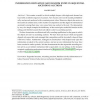Free Online Productivity Tools
i2Speak
i2Symbol
i2OCR
iTex2Img
iWeb2Print
iWeb2Shot
i2Type
iPdf2Split
iPdf2Merge
i2Bopomofo
i2Arabic
i2Style
i2Image
i2PDF
iLatex2Rtf
Sci2ools
142
click to vote
SIGECOM
2008
ACM
2008
ACM
Information revelation and random entry in sequential ascending auctions
We examine a model in which multiple buyers with single-unit demand are faced with an infinite sequence of auctions. New buyers arrive on the market probabilistically, and are each endowed with a constant private value. Moreover, objects also arrive on the market at random times, so the number of competitors and the degree of informational asymmetry among them may vary across from one auction to the next. We demonstrate by way of a simple example the inefficiency of the second-price sealed-bid auction in this setting, and therefore assume that each object is sold via ascending auction. We then characterize an efficient and fully revealing equilibrium for the game in which the objects are sold via ascending auctions. We show that each buyer's bids and payoffs depend only upon their rank amongst their competitors and the (revealed) values of those with lower values. Furthermore, strategies are memoryless--bids depend only upon the information revealed in the current auction, and not...
| Added | 15 Dec 2010 |
| Updated | 15 Dec 2010 |
| Type | Journal |
| Year | 2008 |
| Where | SIGECOM |
| Authors | Maher Said |
Comments (0)

